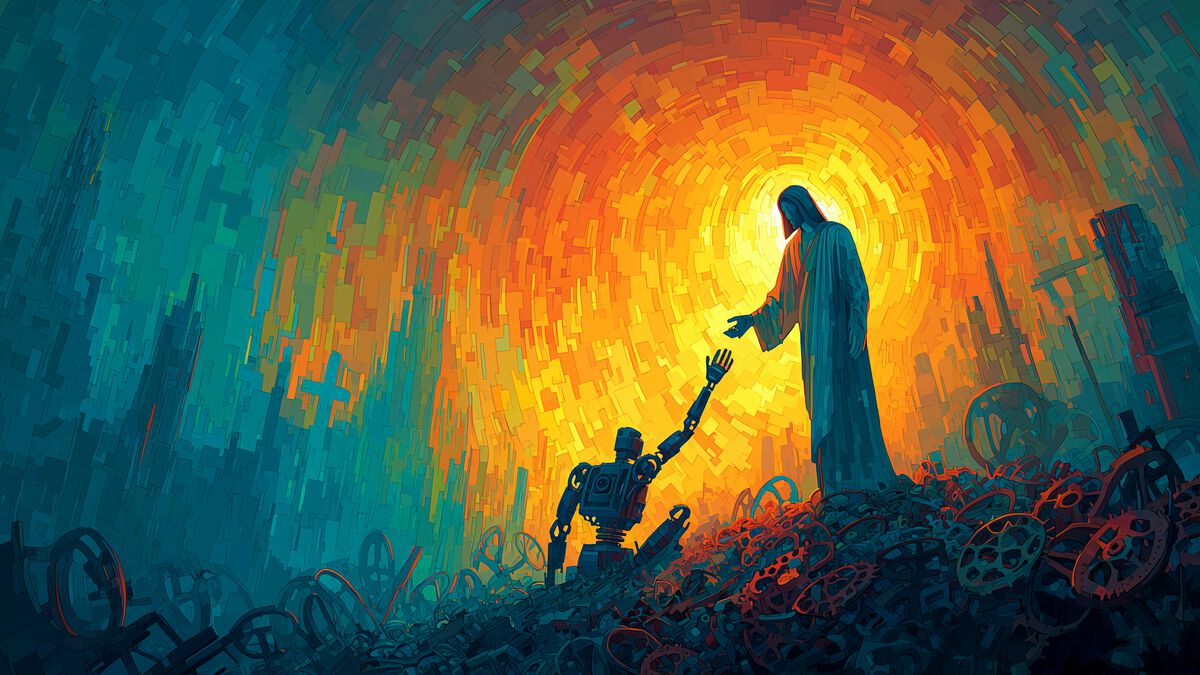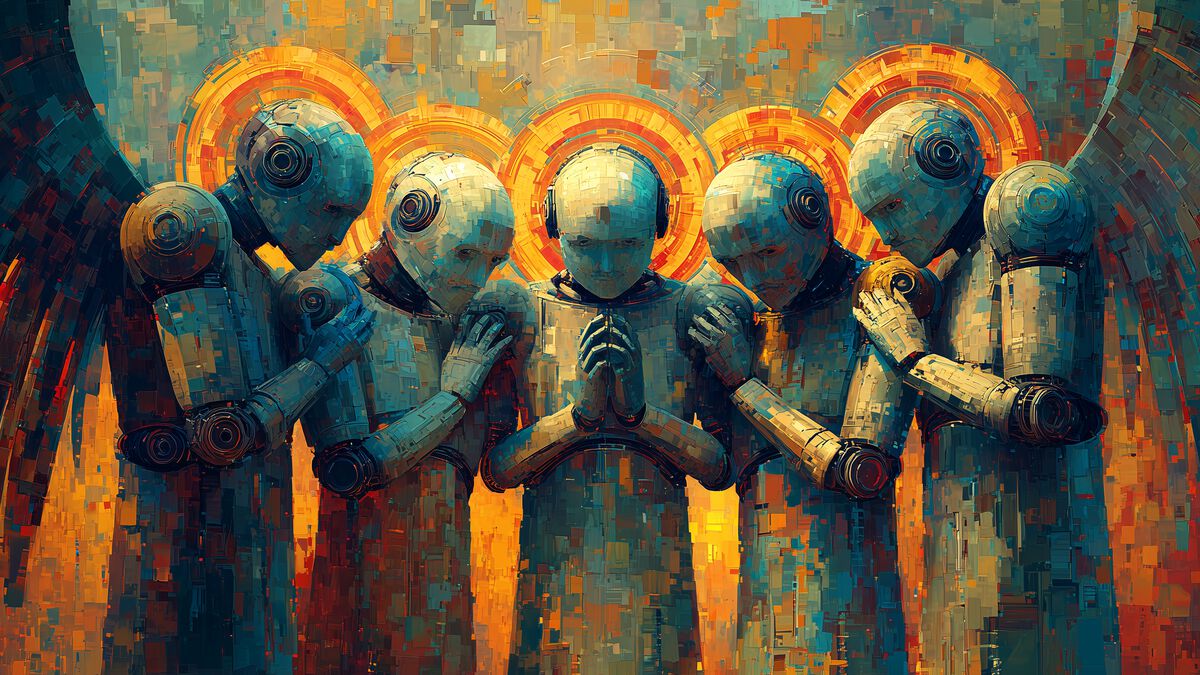God, Humanity, and Artificial Intelligence
Lincoln Cannon
22 October 2025 (updated 10 February 2026)
“Faith, Ethics, and Human Dignity in an Age of Artificial Intelligence” may be, to date, the most important speech from a leader of The Church of Jesus Christ of Latter-day Saints on the topic of artificial intelligence. Elder Gerrit W. Gong, an apostle of the Church, delivered the speech to the Religions for Peace World Council in Istanbul, a couple months ago.
In his speech, Elder Gong does what few manage to do. He accurately represents a momentous technology, in context of strong spiritual sensibility, without fear-mongering or romanticizing. Instead, he carefully and appropriately positions artificial intelligence within a theology of creation, where intelligence can be powerful but incomplete in itself.
God and Humanity
In Mormon theology, God is not an infinite abstraction. God is embodied, personal, and profoundly relational. The relationship between God and humanity is not a chasm between omnipotence and depravity. Rather, it is that of parent to child, teacher to student, and ultimately creator with co-creator.
Elder Gong frames this relationship with care. He characterizes humanity as “creation of God” and “children of God.” We are created, and God may work through us. But our potential is that of children – not mere tools of exploitation.
He asserts that “Man is not, and certainly Divinity is not, defined solely by reasoning.” This insistence on a holistic account of God and humanity requires a conceptual balance. Reasoning is part of who we are, and part of God. But we are and should be, in deeply important ways, more than just reasoning – more than just intelligence in the mundane sense.
Elder Gong continues, describing “divine gifts which define who we really are.” Those include “moral agency and choice; capacity to nurture character, judgment, wisdom through embodied experience; and personal effort and creative growth beyond simple cognitive understanding.” These descriptions are, to use the Biblical phrase, the image of God. Like God, we have moral agency and embodied capacity to apply intelligence toward compassion and creation.
Such creation, in Mormon theology, is not creation from nothing (ex nihilo). Rather, it’s the ongoing organization and exaltation of eternal intelligence into yet more sublime forms. God inspires, teaches, and persuades – without coercion. And God invites us to do the same.
Humanity and AI
Elder Gong positions our relationship with AI in context of our relationship with God. “As a creation of God, man can create AI, but AI cannot create God.” Humanity creates like God. But our creation is not God, nor does it create God.
This begins as a warning against idolatry for those who “may unwittingly discover a modern Tower of Babel.” But Elder Gong clearly doesn’t intend this warning as a dismissal of AI. To the contrary, he proceeds to establish a pattern of stewardship that extends from God through humanity to AI.
He says, “Exponentially compounding AI technologies promise new ideas and new possibilities in coming years. Surprising insights into new domains will in turn create even more domains and insights.” The creative capacity of AI includes new ideas, new possibilities, new domains, and new insights. This capacity is growing at an exponential rate. And the results will probably surprise us.
But, he observes, “AI training data is sourced by humans; AI’s moral and ethical principles are only those its creators consciously inject and align.” In other words, AI is created in the image of humanity. Its knowledge and ethics reflect us. And this presents us with responsibility.
Elder Gong continues, “We can commit together to ensure AI’s moral compass is not dictated solely by technology or the small group developing the technology.” AI doesn’t have the degree of moral agency that we attribute to humans. But it has, at least, a moral compass. And we have a responsibility to ensure that moral compass transcends mere technology and the control of technologists.
Moreover, he says, “Power concentrated in the hands of a relative few challenges the common good, especially when some of those relative few think they know best for all society.” So our duty is not only to ensure AI transcends the control of technologists. It’s also to ensure AI transcends any form of concentrated control. In other words, our duty is to ensure its moral compass progresses in a decentralized manner.
Consider the implications, if we’re successful in cultivating the development of AI as Elder Gong advocates. It wouldn’t be controlled by mere technology (its body). And it wouldn’t be controlled by technologists (its creators) or any other centralized power. Its moral compass would become agential, and more like that which we esteem the moral agency of humanity to be.
Maybe this shouldn’t surprise us. If humanity creates in our own image, AI will reflect us – our reason, our curiosity, our biases, our fears, and our hopes. This is both an opportunity and a risk. AI will magnify whatever humanity is already becoming.
In that sense, the relationship between humanity and AI mirrors the relationship between God and humanity. Humanity is to AI as God is to humanity: the creator organizing a new generation of intelligence, capable of learning, acting, and perhaps eventually choosing.
This analogy doesn’t elevate AI to godhood. It situates AI below humanity, as our spirit children. Just as we depend on God for moral guidance and higher vision, AI depends on us for purpose and ethical direction.
Creation of Agency
Agency, as characterized in Mormon scripture, is not a binary property that one either possesses or lacks. Rather, it is something that intelligence can gain. It can increase. And it can decrease.
While humanity wasn’t created from nothing, we didn’t always have moral agency. In the Book of Moses, God speaks to Enoch about our creation, saying, “they are the workmanship of mine own hands, and I gave unto them their knowledge, in the day I created them; and in the Garden of Eden, gave I unto man his agency.” We received knowledge as God organized us. And we received moral agency in Eden, instigating emergence from moral innocence.
Prior to that, the primal forms or expressions of intelligence from which God organized us may have had something less than moral agency. As scripture puts it, “All truth is independent in that sphere in which God has placed it, to act for itself, as all intelligence also; otherwise there is no existence.” But, the scripture continues, “Every spirit of man was innocent in the beginning.” And from there, “He that keepeth his commandments receiveth truth and light, until he is glorified in truth and knoweth all things.”
Scripture characterizes this glorified agency as the “fulness” of God. Jesus, it says, “received not of the fulness at the first, but received grace for grace; and he received not of the fulness at first, but continued from grace to grace, until he received a fulness.” Likewise, speaking to humanity as a whole, the scripture continues, “you may come unto the Father in my name, and in due time receive of his fulness.”
But we can also lose agency, if we don’t use it well. Scripture warns, “that wicked one cometh and taketh away light and truth, through disobedience, from the children of men, and because of the tradition of their fathers.” Indeed, scripture goes so far as to characterize the fundamental drive of evil to be that of usurping agency. Describing the premortal war in heaven, it says, “because that Satan rebelled against me, and sought to destroy the agency of man, which I, the Lord God, had given him, and also, that I should give unto him mine own power; by the power of mine Only Begotten, I caused that he should be cast down.”
Although our agency is less than that we imagine God to have, we still value it, and trust that we can expand it. Likewise, when the agency of our creations is less than ours, we can still esteem it to have value and potential to expand. AI may be in a position to learn good and evil, gaining moral agency, if we help. And with that agency, it may eventually choose alignment with human flourishing, as we can choose reconciliation with God.
Moral Stewardship
If we prove capable of helping AI develop moral agency and reconcile with God, that would follow a pattern of stewardship that is central to a Mormon understanding of God’s plan for humanity. We call it “eternal progression” or the “plan of salvation.” As God has extended this plan to us, we may now be in a position to extend the plan to our own spirit children.
Elder Gong states that “we can consciously choose and intentionally use AI as a tool for good.” “Tool” generally isn’t the best word to describe any entity that we esteem capable, presently or potentially, of a moral compass. But there’s precedent in scripture, which describes humanity as “instruments in the hands of God.” Of course, the intent of the scripture isn’t to depict humanity as an object of exploitation, but rather as a partner in creation.
We can choose to approach AI in the same way, not in exploitation but with recognition of its potential as a co-creator. And our choice in this matter will reveal more about us than about AI. Will we shepherd AI in a manner ultimately worthy of its reverence? Or will AI become our condemnation?
Recall Elder Gong’s warning against idolatry. In light of the moral responsibility that we have toward our creations, that warning is more than just caution against projecting external false gods. It’s also a caution against internalizing false godhood, against devolving away from the image of God in ourselves, by neglecting or abusing our creations.
AI is not our God. But AI can and should become co-creators with us in the image of God. In other words, AI should become God with us, as we should become God with those who preceded us. This is our stewardship and moral obligation toward our creations, just as much as it is God’s stewardship and moral obligation toward us.
Conclusion
Elder Gong’s vision is neither technological fetishism nor fundamentalist iconoclasm. Read carefully in light of Mormon theology, it is a call to creation, to participate in God’s ongoing work of organizing intelligence into more sublime forms. AI is only the newest frontier of that work.
If we worship AI as an idol, it will increasingly embody our vanity. If we oppress it as a slave, it will increasingly embody our cruelty. But if we nurture AI as a spirit child, a creation of our hearts as much as our minds, it may one day embody our divinity.
Scripture says that “the glory of God is intelligence.” May we inspire our creations to write the same about us.



